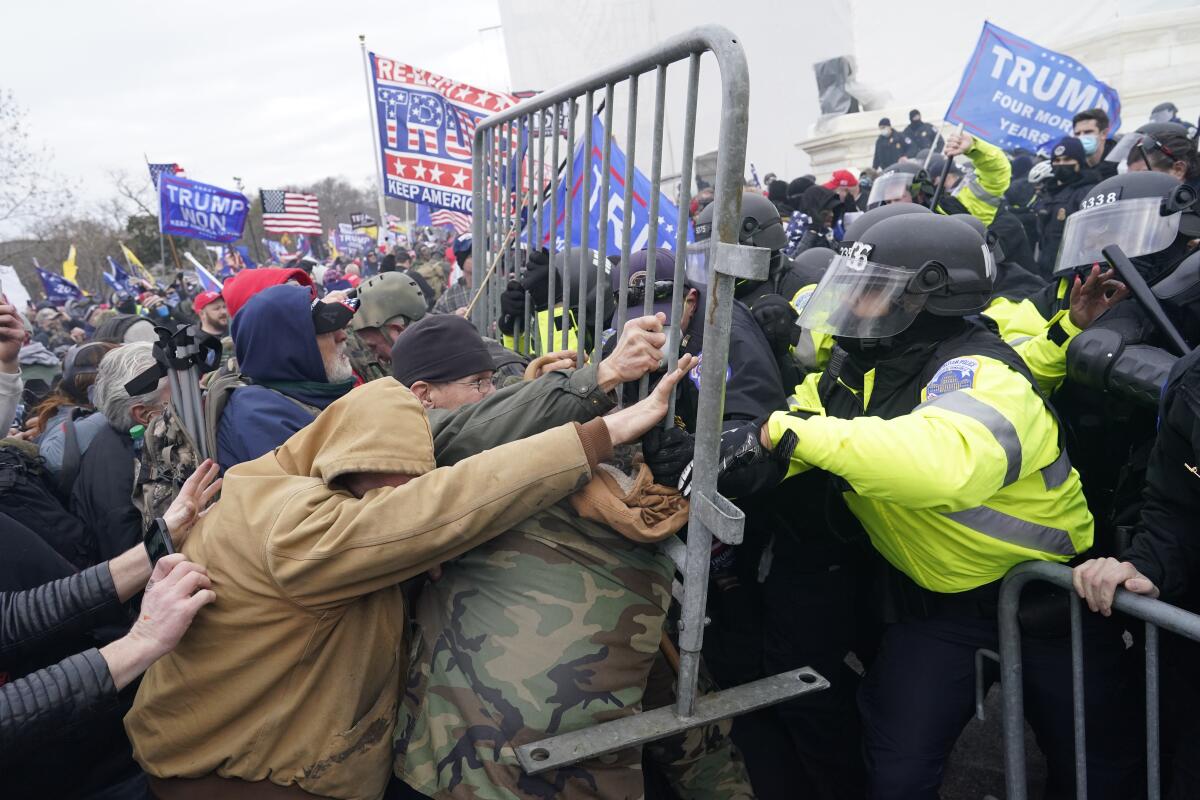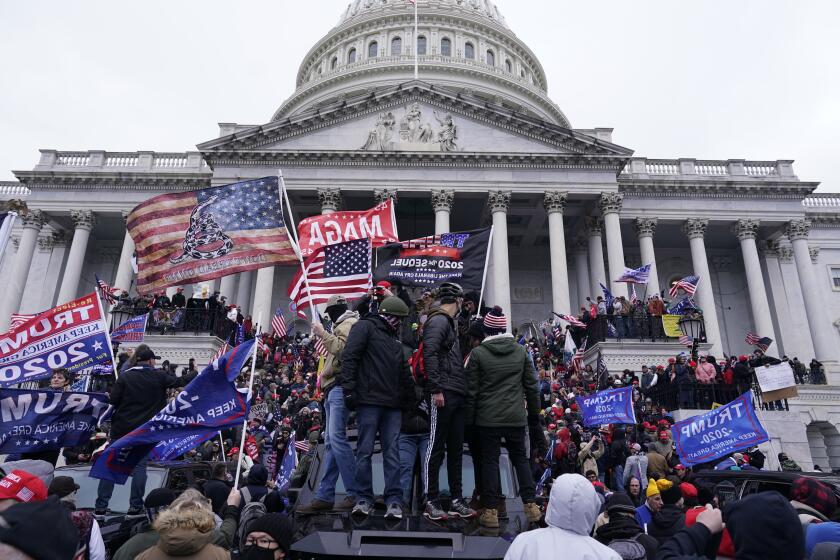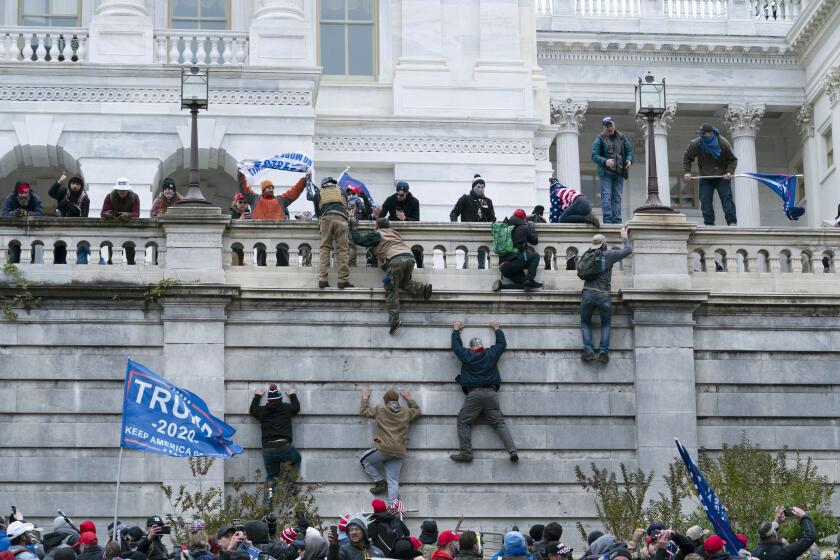‘Tearing us apart’: For a watching nation, Capitol riot marks a surreal unraveling

- Share via
For many Americans watching from afar, the violent breaching of the U.S. Capitol on Wednesday by extremist partisans of President Trump resounded with the echoes of another national tragedy, giving rise to an almost vertigo-inducing sensation: a rip in the fabric of time.
“It felt like watching the towers come down — it was that surreal,” said Renee Ryan, who sat in her Seattle home Wednesday with her son, Wolf, and remembered the feeling of unreality on Sept. 11, 2001, as the world was transfixed by the unfolding attack on the World Trade Center. “Except [now] it was our own people.”
Livestreamed and live-tweeted, unspooling in jumbled images across wide-screen TVs and flashed on countless mobile phones, the storming of the Capitol by an angry mob egged on by Trump — which interrupted the ritual counting of presidential electoral votes, forcing lawmakers and staff into unceremonious flight — marked a calamitous free-fall on the heels of a woeful year.
Playing out against a backdrop of polished marble floors and stately columns familiar to nearly every American from long-ago civics classes and grade-school field trips, the ragged insurrection on a winter’s day reverberated across the land, sowing sorrow and bafflement, furious recrimination and numb resignation, and in some cases, a heady brand of dark glee. Four polarizing years had crystallized into members of Congress fleeing from men in MAGA hats carrying flags emblazoned with coiled snakes.
In an era in which it has become commonplace to wring hands over the nation’s soul, the state of that soul seemed more opaque and enigmatic than it has in many, many years. This isn’t America, said so many. Then came the jarring rejoinder, whispered or said aloud, to others or themselves: But it is. Oh, it is.
For some, the timing of the violent outburst was particularly cruel and vexing. Ilse Mendez, a DACA recipient from south Texas, awoke energized to know that President-elect Joe Biden’s win would be confirmed by a joint session of Congress. That jubilation swiftly turned to the anxiety that has been woven through much of Trump’s tenure.
“What has our country become?” she asked. She had felt more of a sense of safety after the Supreme Court last year rejected the termination of DACA, a program that protects people brought to the country illegally as children. But now she’s again afraid, not only for herself, but for America — a “pinnacle moment,” she called it.
In the wake of the mob attack on the U.S. Capitol, the top two Democrats in Congress — Nancy Pelosi and Charles Schumer — called for the removal of President Trump from office.
Some saw a searing reverse image of the racial justice protests that swept the country last year after the death of George Floyd at the hands of Minneapolis police. The sight of an overwhelmingly white rabble pushing its way through barricades and past police officers, capering and reveling in the corridors of power, was an all-too-familiar reminder of a tormenting racial disparity in the use of state-sanctioned force.
“I’m in horror, yet I’m also not,” Denita Obojememe, a 35-year-old Black mother of two who lives in Strongsville, Ohio. She believed Wednesday’s episode laid bare the country’s racism and hypocrisy.
“If there’s anything good to come out of Trump’s presidency, it’s that America is finally being exposed for who she really is,” she said.
In Chicago, Donald Williams, who lost a son to gun violence, also believed Black protesters would have encountered a far, far harsher response. “There would be rubber bullets and mass arrests right away,” he said.
Like many across the country, Williams described wrenching regret at the idea of young people viewing the trampling of a site so redolent of the ideals of American democracy.
“Our kids are seeing this right now,” he said. “This is a low, low moment for this country.”
Some Americans who supported Trump but anticipated a peaceful transition of power to Biden were jolted by what they saw instead. Dick Wadhams, a former chairman of the Colorado Republican Party, watched the “terrifyingly disturbing” scenes from his home in Denver.
“This is America,” he said. “I cannot believe what we’re seeing take place.”
Trump supporters gather in the U.S. capital to protest the ratification of President-elect Joe Biden’s electoral college victory over President Trump.
Wadhams said Trump’s inflammatory address to protesters assembled near the White House, in which the president claimed again to be the rightful winner of the November election — was “full of lies.” But he blamed “the extremes on both sides of the political divide in this country” for the tipping into bedlam.
“We need calm in this country,” he said. “This is not calm.”
A Republican evangelical pastor, the Rev. Josh Saefkow, watched TV in his church office in Fayetteville, Ga. He had hoped for a Trump victory, but he accepted that Biden had won, and was aghast at what he saw.
“Rioting is not a protest,” he said. “This is what happens when people expect a political savior to solve spiritual problems.” In Trump, he saw “a man who has fallen short of the glory of God.”
Other Trump backers, though, actively rejoiced. Barrett Haynes, 66, literally danced as he waved a Trump campaign sign on a busy Houston highway overpass. Upon hearing of the storming of the Capitol, the out-of-work designer of dental implants smiled.
“It’s about time,” said Haynes. He offered fervent support for Trump’s false election claims: “It was not won by Biden and his handlers.”
For some, Wednesday’s overrunning of the Capitol was a matter of grim deja vu. Oregon state Rep. Alissa Keny-Guyer watched eerily similar scenes unfold on Dec. 22, when right-wing protesters stormed the statehouse in Salem, Ore., during a special legislative session. The far-right group Patriot Prayer clashed with police outside, and some managed to enter.
“Trump has been destroying institutions of democracy on a policy and administrative level, and now we’re watching it on a physical level,” she said. “What Trump’s supporters should be doing is going back and working hard to build grass-roots, support for the policies they believe in, and not try to overthrow democracy.”
Trump’s acolytes in Congress mortgaged their integrity out of self-interest. Can they pull back from the brink?
In Seattle, aspiring nurse Ryan, 60, felt maternal pain along with larger grief for a suddenly unfamiliar America. Her son is home from UCLA, taking his premed classes online, and the two gazed together at the televised turmoil.
“Watching it with this young person, my son, it’s literally heartbreaking seeing our country like this,” she said. “Here he is, the next generation, already worried about climate change, will he get a job, what will medicine look like, and now this — will we even have a democracy?”
Mother and son were horrified as protesters rampaged in House Speaker Nancy Pelosi’s offices, flipping over tables and yanking photos off walls. “I felt like they were in my home, that same kind of violation,” Ryan said.
Yet she felt a certain sympathy for those who had taken up Trump’s failed cause as their own.
“They’re being exploited, they can’t make a living wage, they can’t get out of a rut,” she said. “They don’t have a group any more. So now they’ve found this group — now they feel this is where they belong.”
Times staff writers Kaleem and Lee reported from Los Angeles, King from Alexandria, Va., Read from Seattle and Hennessy-Fiske from Houston.
More to Read
Sign up for Essential California
The most important California stories and recommendations in your inbox every morning.
You may occasionally receive promotional content from the Los Angeles Times.
















